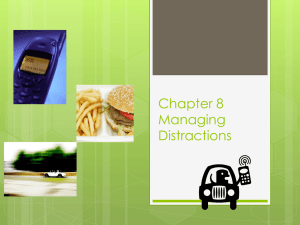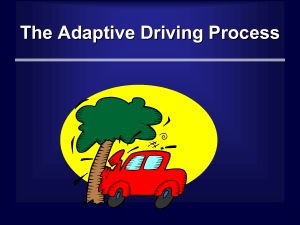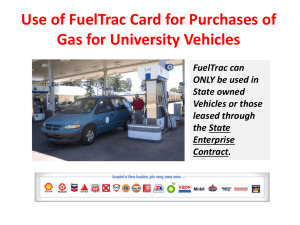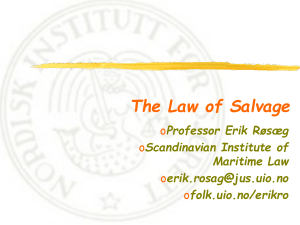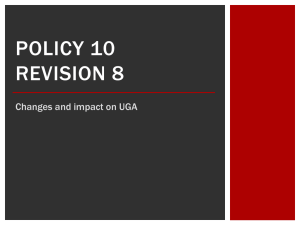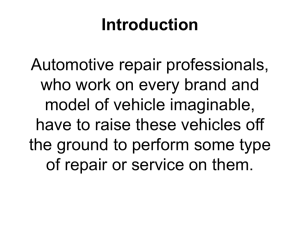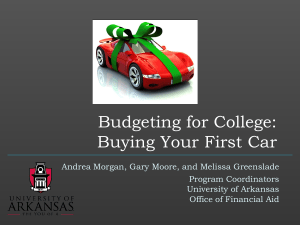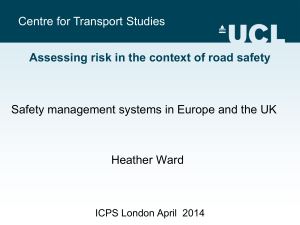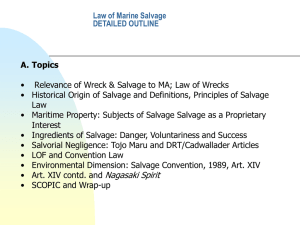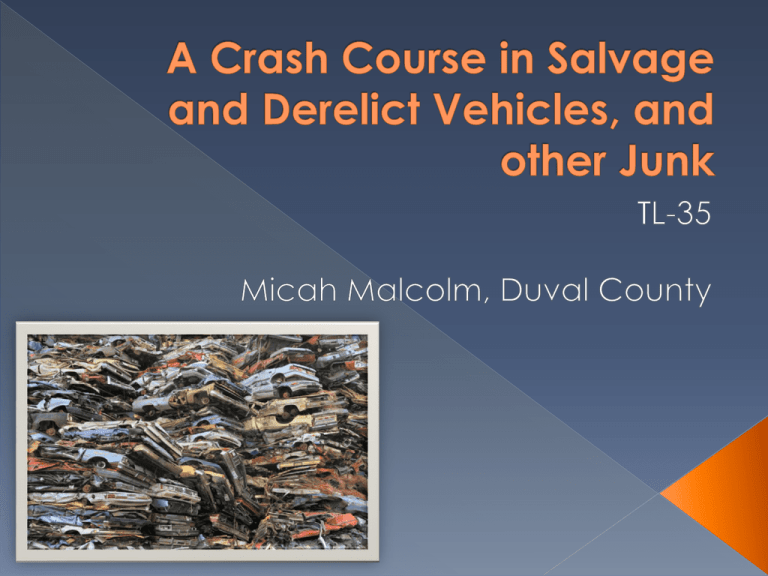
Opportunities for Fraud:
-Steal a vehicle, take it to another state,
get a valid title by submitting fraudulent
documents
-Switching a VIN plate from a junked car to
conceal the identity of a stolen vehicle
-Significantly damaged vehicles
(junked/salvage) sold to a new consumer
without disclosing the condition of the
vehicle
Salvage Vehicles
› Understanding a Total Loss
› Rebuildable vs. Unrebuildable (CD)
Junk Vehicles
› Knowing your ‘junk’
› Useable parts of junk/salvage
Derelict Vehicles
› Salvage Dealers and
Secondary Metals Recyclers
› Derelict Rules
› Compared to Junking
NMVTIS & Odometers
Salvage is when there has been damage to
a vehicle or mobile home and has been
declared a total loss by an individual or an
insurance company. After the vehicle is
declared salvage a title can be issued
based on extent of the damage to the
vehicle or mobile home. Throughout this
information whenever a “vehicle” is
mentioned it also refers to mobiles homes.
A Rebuilt vehicle is a motor vehicle or
mobile home built from salvage or junk.
319.30(3)(a)1,b: Total loss on an uninsured
mobile home/motor vehicle that is
wrecked or damaged when the cost of
repairing or rebuilding is 80% or more of the
cost of replacing with like kind or quality.
319.30(3)(a)1: Total loss on an insured
vehicle is when insurance pays the owner
to replace the wrecked or damaged
vehicle with one of like kind or quality,
instead of repair.
319.30(3)(a)(2): A vehicle is not a total loss if
insurance and the owner agree to repair
instead replace. If the cost to repair exceeds
100% of the replacement cost, the vehicle is
branded as a ‘Total Loss Vehicle’.
319.30(3)(b): If the vehicle is equipped with
custom-lowered floors for wheelchair access
or a wheelchair lift, and insurance determines
the vehicle is in a repairable condition for safe
operation on the roads/highways, it may be
submitted for a salvage-rebuildable title and a
brand of ‘Insurance Declared Total Loss’.
The owner or insurance company is to
forward the title to the department
within 72 hours for processing after the
vehicle becomes salvage.
The salvage rule does not apply to
vehicles that retail for less than $1500 in
an undamaged condition.
When a vehicle is wrecked or damaged:
Is the vehicle insured?
› Is insurance going to declare it a total loss
(replace rather than repair)?
› If uninsured/self-insured, will the vehicle be
salvaged by the owner?
Will repairs be less than 80% of the
vehicle’s current retail value (SalvageRebuildable), or 80% or more (Certificate
of Destruction)?
AKA, Salvage
Unrebuildable. The
death certificate for a
car.
Used to sell a motor
vehicle or mobile home
for parts or scrap.
Proof of Ownership: Florida title, MCO, or
out of state title
Form 82363
VIN Verification if out of state title
Lien Satisfactions
Possible sales tax if not a Florida title
If rebuildable, TL-37 describes the process.
If a Certificate of Destruction, it’s scrap.
Determined by completing Section 4 of form
82363:
Vehicle A
Vehicle B
Current Retail Cost
$10,000
$10,000
Multiply by .80
$8,000
$8,000
Estimated cost of
repair to physical
and mechanical
damage
$9,500
$3,500
Difference
$1500
$5500
Certificate of
Destruction
Salvage
Rebuildable or
Salvage
Rebuildable-Flood
Outcome
What is a Junk Vehicle?
› AKA, non-repairable. Indicates a vehicle is
incapable of operation on roads or
highways and has no value except as a
source of parts or scrap.
› Applies to mobile homes or motor vehicles
› Can be declared by an owner, insurance
company, or a salvage dealer/secondary
metals recycler with valid title reassignment
› Has some advantages over applying for a
Derelict Motor Vehicle Certificate (Free!)
Motor Vehicles: Fenders, hoods, bumpers, cowl assembly/fire wall,
rear quarter panel, trunk lid, door, decklid, floor pan, engine, frame,
transmission, catalytic converter, airbag.
Truck components: Include above and truck beds, including dump,
wrecker, crane, mixer, cargo box, or any bed that mounts to a truck
frame.
Motorcycle major component parts: include body assembly (frame,
fenders, gas tanks) engine, transmission, front fork assembly, wheels.
Mobile home parts are defined as the frame.
*Parts require bills of sale/receipts from the seller with name, address
and signature (no signature needed for a business receipt) and the
ID number for each component part must be shown
Florida title must be available, with the notation
“Junked” across the face.
Lien satisfactions are required.
No fee for this transaction.
If not a Florida title record, it should be submitted
to the title issuing state to be junked.
Secondhand Dealers
Registered
Secondary Metals Recyclers
(SMRs)
Year*
#
Year*
#
2008
1911
2008
278
2009
2997
2009
580
2010
4498
2010
683
2011
4491
2011
769
2012
5661
2012
911
*Totals as of August of each year
Only 8 counties in Florida saw a
decrease in Secondary Metals Recyclers
Registrations from 2011 to 2012
23 counties have at least 10 SMR’s
The top 5: Miami-Dade (102),
Hillsborough (73), Duval (57), Broward
(56), and Orange (49)
Salvage Dealers have an SD license through
DMS/Regional DMS offices.
Secondary Metals Recyclers are registered (DR11S) through Department of Revenue. Local Law
Enforcement can obtain reports that list names
and addresses in a jurisdiction by calling
800-352-3671.
Salvage, scrap metal and recycling centers are
examples of businesses that must register as
secondary metals recyclers. If they acquire
salvage or wrecked motor vehicles for the
purpose of reselling them and their parts, they
must register with DMS for a salvage motor
vehicle dealer license.
A Derelict Motor Vehicle Certificate may only
be applied for by a Licensed Salvage Motor
Vehicle Dealer (SD), or a Secondary Metals
Recycler.
SD licenses are issued by the Department of
Motorists Services. An SD license is used for
acquiring and reselling salvaged and wrecked
vehicles or their parts.
Salvage, scrap metal, and recycling center
businesses must register as secondary metals
recyclers (not for reselling or part sales) with the
Florida Department or Revenue.
Defined as a motor vehicle or mobile
home 10 model years old or older
Valued under $1000
In a condition that it’s highest primary
value is for sale, transport, deliver to a
licensed Salvage Dealer or Secondary
Metals Recycler for dismantling or
conversion to scrap metal
Trailers follow the same rule except they
can be valued less than $5000
Issued by the department to serve as
evidence that the vehicle will be
dismantled or converted to scrap metal.
Derelict certificates may only be
reassigned once.
Seller can be the owner of record or
someone assuming physical possession and
responsibility and attests that possession
was obtained through lawful means with all
ownership rights.
Seller does not include Towing Companies
(TL-26), Repair Shops (TL-25), and Landlords
(TL-16) unless they obtain title or certificate
of destruction in their name prior using the
process outlined in the proper TL procedure.
Salvage dealers or SMR’s must make
payments for the purchase of any
derelict motor vehicle to the seller who is
not the owner of record by check or
money order. This must be made
payable to the seller and not the
transporter.
Junking
Derelict
Done by an owner or insurance
company, Salvage Dealers and
Secondary Metals Recyclers
Done by Salvage Dealers or
Secondary Metals Recyclers only
Title must be available
Title does not have to be
available
Must have lien satisfactions
Liens may be deleted if over 3
years old, or notice sent to
lienholders to protest if 3 years old
or less
Title must have reassignment
completed
Age must be 10 model years old
or older
No age or value requirements
Value for Vehicles and Mobile
homes under $1000, Trailers under
$5000
No fees
Fees
Form 82137 and lien satisfactions.
› If a lien is 3 years old or older, it may be
deleted.
› If a lien is less than 3 years old, a 10 day DV
stop is placed. The department notifies the
lienholder:
If the lienholder responds, a 30 day admin stop
is placed allowing for the lienholder to apply
for title or a certificate of repossession.
If the lienholder does not respond, the lien is
deleted and the destruction is authorized.
VERY IMPORTANT! The department and law
enforcement rely on us to properly screen
these forms.
Section 1 requires a LEGIBLE copy of the
owner/seller’s Driver License or ID Card,
along with their number and State of issue.
If the seller is not the owner of record, a
SMUDGE-FREE right thumb print should be
obtained, or another digit if no right thumb.
Section 2 is completed by the transporter
being hired for the owner to a licensed
salvage dealer/SMR. If the owner/seller or
salvage dealer/SMR transports the vehicle
in lieu of a transporter, this section may be
left blank.
The transporter is making a certification
that section one is properly completed.
SECTION 3 is completed by the salvage
motor vehicle dealer/SMR. This should be
accurately completed.
The perjury clause along with the foregoing
statement would serve as necessary
evidence in the event fraud is being
committed.
-NMVTIS checks for brands or vehicle
conditions. This includes brands that may not
be recorded on a title from one state, but
branded in a previous state (title washing).
-NMVTIS will check for Salvage-Theft brands, or
if a vehicle was junked.
-NMVTIS also allows Law Enforcement to
create lists of vehicles by junk and salvage
yards, or vehicles reported as junk or salvage
by insurance.
-Junk and salvage vehicles are to be reported
monthly to NMVTIS.
*Unless otherwise exempt (over 10 years old,
GVWR > 16,000 lbs), an odometer disclosure
must take place.
*True Mileage Unknown (TMU) or blank entries
aren’t acceptable for non-exempt vehicles
*If the business is unable to obtain mileage for
a specific reason (keys, fire), then 999,999
should be entered and ‘Not Actual’ as the
certification. An affidavit must be submitted
stating why the reading could not be
obtained.
*If the vehicle is exemptable, you should still try
to obtain mileage but the work would not
have to be rejected if the customer elects to
mark as exempt.
*Omissions, Alterations, and Discrepancies still
can apply, as well as the conflict of interest
with a power of attorney (82053).
*Form 82995 is not limited to dealers and
insurance companies, so it may be used by
individuals in the circumstances of duplicate
application or not-released by the lienholder.


